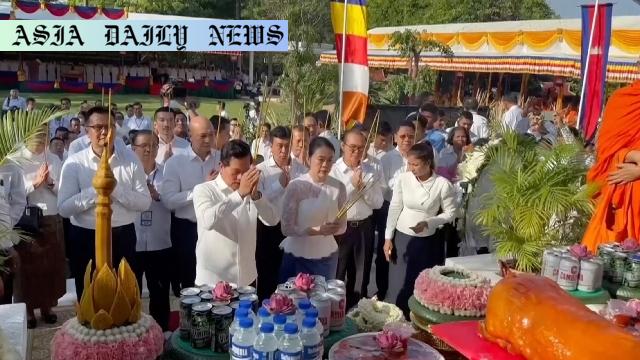Khmer Rouge: Cambodia marks the 50th anniversary of the genocide that claimed at least 1.7 million lives, calling attention to peace.

Introduction to Cambodia’s History of Tragedy
On May 20th, Cambodia solemnly commemorated the 50th anniversary of one of its darkest chapters—the genocide orchestrated by the Khmer Rouge regime. The atrocities carried out between 1975 and 1979 claimed more than 1.7 million lives, amounting to over a fifth of the nation’s population at the time. Designated as Cambodia’s ‘National Day of Remembrance,’ May 20th marks a day of reflection, remembrance, and continued learning to prevent such devastation from recurring in the future.
The Khmer Rouge regime, under the leadership of Pol Pot, sought to implement an extreme form of communism. Their brutal policies led to catastrophic outcomes, including forced labor, systematic eradication of intellectuals, and genocide. Today, Cambodia strives to preserve the memory of these atrocities to ensure that lessons from this dark period are passed on to future generations.
Honoring Victims Through Memorial Services and Art
This year, around 2,000 people gathered at a memorial site in Phnom Penh, on the grounds of one of the infamous ‘Killing Fields.’ The event hosted re-enactments performed by students from a local art university, recreating the horrific violence to highlight the depth of suffering experienced during this era. Participants, including government officials and survivors, emphasized the significance of remembrance and education in efforts to maintain peace.
Among the attendees was a 70-year-old survivor who stressed the importance of defending peace. She, like many others, spoke of how fragile peace is and how easily such horror could be repeated if vigilance is lost. Her message served as a poignant reminder to younger generations, who now represent over 70% of Cambodia’s population and were born after the collapse of the Khmer Rouge regime.
Cambodia’s Efforts to Educate Future Generations
One of Cambodia’s ongoing challenges lies in its ability to educate younger citizens about the magnitude of the Khmer Rouge atrocities. With the majority of the population born post-1979, knowledge of these events often comes second-hand through stories, museums, and educational programs. Museums like Tuol Sleng Genocide Museum and events like the memorial service play pivotal roles in preserving this tragic history.
Educational initiatives aim to engage young Cambodians with discussions about the past, fostering a culture of remembrance that prioritizes peacebuilding. Cambodia’s Senate President and former Prime Minister Hun Sen highlighted the nation’s fragile peace, urging citizens to protect it passionately to avoid repeating history’s darkest moments.
The Path Forward: Lessons for Global Peace
Globally, Cambodia’s remembrance of the Khmer Rouge genocide raises awareness about the devastating impacts of extreme ideologies and unchecked power. The continued focus on education and dialogue ensures that the lessons of Cambodia’s past can inspire broader commitments to justice and conflict prevention worldwide.
As the country presses forward, efforts to document survivor testimonies, preserve historical sites, and build curricula focused on the Khmer Rouge genocide remain central to its mission of safeguarding peace. This anniversary serves not only as a time for grief and reflection but also as a call to action for all who value resilience and the sanctity of human life.
Commentary
An Important Reminder of the Fragility of Peace
The 50th anniversary of the Khmer Rouge genocide presents a profound moment of reflection for Cambodia and the world. More than a commemoration, it is a powerful reminder of humanity’s capacity for both suffering and resilience. As the stories of survivors are retold, there is an underlying plea for vigilance and advocacy in protecting the peace that nations strive to achieve.
Hearing the account of a 70-year-old survivor reinforces the critical importance of peace as a societal foundation. Her words serve as a timeless warning: peace is fragile, and its destruction can have catastrophic effects. Today’s youth, born long after these atrocities, must take up the mantle of ensuring such events remain in the past. This responsibility falls not just on Cambodians but on all societies invested in guarding against oppression and exploitation.
Lessons from Cambodia’s Dark History
What strikes me most about the Khmer Rouge is the sheer scale of the devastation they caused. As someone who values history, examining regimes like Pol Pot’s only adds to my appreciation of democratic institutions and the freedoms some of us take for granted. It’s heart-wrenching to think how millions of lives were truncated by systematic cruelty, yet it’s equally inspiring to see how Cambodians, as a nation, are uniting to ensure these memories ignite actions for peace.
A Call to Action for Future Generations
As the global community reflects on these events, there is an inherent responsibility to amplify Cambodia’s call for action. Stories like this emphasize the importance of educating younger generations—not through fear but through empowerment—teaching them that understanding history equips us to shape a better future. Cambodia has shown that even in the aftermath of overwhelming tragedy, peace and progress are achievable.


